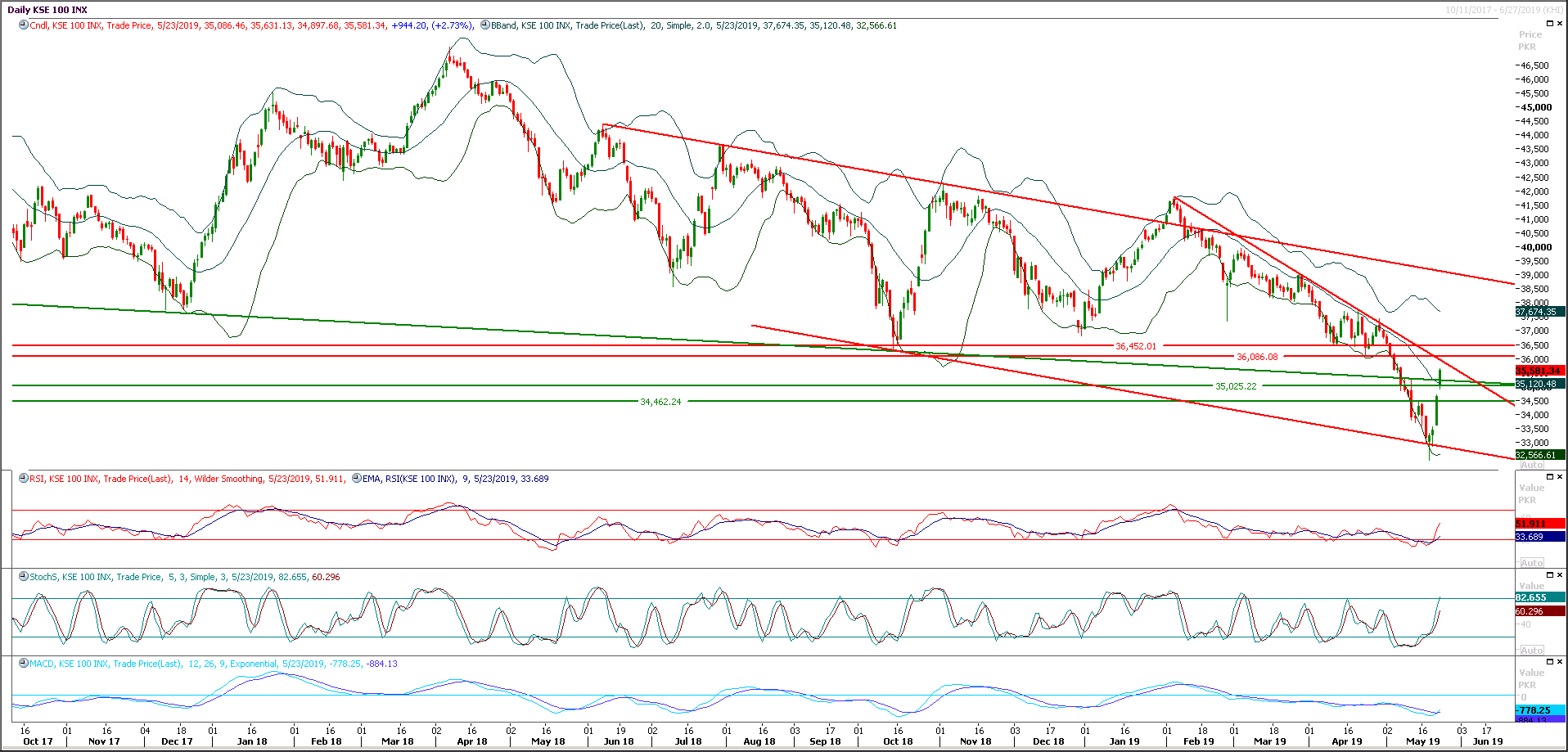Previous Session Recap
Trading volume at PSX floor increased by 24.21 million shares or 11.90% on DoD basis, whereas the benchmark KSE100 index opened at 35,086.46, posted a day high of 35,631.13 and a day low of 34,637.14 points during last trading session while session suspended at 35,581.34 with net change of 944.20 points and net trading volume of 164.00 million shares. Daily trading volume of KSE100 listed companies increased by 23.57 million shares or 16.74% on DoD basis.
Foreign Investors remained in net selling positions of 0.71 million shares but net value of Foreign Inflow increased by 2.36 million US Dollars. Categorically, Foreign Corporate remained in net buying positions of 2.22 million shares but Foreign Corporate and Overseas Pakistanis Investors remained in net selling positions of 0.19 and 2.75 million shares. While on the other side Local Companies, Banks and Mutual Funds remained in net buying positions of 51.41, 0.58 and 2.66 million shares respectively but Local Individuals, Brokers and Insurance Companies remained in net selling positions of 41.19, 2.42 and 2.87 million shares respectively.
Analytical Review
Fears of deeper U.S.-China trade war push Asian shares to four-month low
Asian stocks stumbled to a four-month low on Friday and crude oil plunged on worries the U.S.-China trade spat was developing into a more entrenched strategic dispute between the world’s two largest economies, pushing investors to safe-haven assets. MSCI’s broadest index of Asia-Pacific shares outside Japan edged down 0.2 percent to a fresh four-month low, and was on track for a third straight weekly loss, down 1.0% so far on the week. Chinese shares recovered slightly, with the benchmark Shanghai Composite up 0.2% and the blue-chip CSI 300 rising 0.3%, while Hong Kong’s Hang Seng added 0.2%. Japan’s Nikkei average dropped 0.7%.
Budget deficit jumps to record Rs1.9 trillion in just nine months
Pakistan’s budget deficit has swelled to record Rs1.9 trillion (5 percent of GDP) in just nine months due to massive increase in expenditures and shortfall in tax collection. The country’s expenditures have enhanced to Rs5.51 trillion as compared to the revenues of Rs3.58 trillion during nine months (July to March) of the current fiscal year. The budget deficit was recorded at Rs1.9 trillion (5 percent of the GDP), according to the latest data of ministry of finance. The deficit was only 4.3 percent of the GDP (Rs1.48 trillion) in the same period of previous fiscal year.
Govt proposes development outlay of Rs1.837tr for 2019-20
Amid protest by Sindh, the Annual Plan Coordination Committee (APCC) Thursday finalises national development outlay of Rs 1.837 trillion for fiscal 2019-20. A meeting of the Annual Plan Coordination Committee (APCC) was held here under the chairmanship of Minister for Planning, Development and Reforms Makhdum Khusro Bakhtyar. Provincial finance ministers, federal secretaries, officials from provincial governments attended the meeting.
Rs1.837tr development outlay set for 2019-20
Fixing the budget announcement date on June 11, the government on Thursday approved a consolidated development portfolio of Rs1.837 trillion, targeting an economic growth rate of four per cent for the next fiscal year. A meeting of the Annual Planning Coordination Committee (APCC) presided over by Minister for Planning and Development Mukhdum Khusro Bakhtyar was marred by strong protests from the Sindh government for ignoring the province in federal-funded schemes and dropping dozens of its ongoing projects. The planning minister said a coordination committee had been set up to address concerns of the provinces.
Budget deficit jumps to record Rs1.9 trillion in just nine months
Pakistan’s budget deficit has swelled to record Rs1.9 trillion (5 percent of GDP) in just nine months due to massive increase in expenditures and shortfall in tax collection. The country’s expenditures have enhanced to Rs5.51 trillion as compared to the revenues of Rs3.58 trillion during nine months (July to March) of the current fiscal year. The budget deficit was recorded at Rs1.9 trillion (5 percent of the GDP), according to the latest data of ministry of finance. The deficit was only 4.3 percent of the GDP (Rs1.48 trillion) in the same period of previous fiscal year. The deficit is rapidly enhancing due to the whopping increase in expenditures especially in interest payment. Meanwhile, the government is also facing record shortfall in tax collection, which is another reason behind widening of budget deficit . The incumbent government had introduced two mini budgets and slashed the development budget to control the deficit. Interestingly, the austerity plan announced by Prime Minister Imran Khan has also failed to control the expenditures of the country. The deficit has touched all-time high Rs1.9 trillion in nine months’ period.
Asian stocks stumbled to a four-month low on Friday and crude oil plunged on worries the U.S.-China trade spat was developing into a more entrenched strategic dispute between the world’s two largest economies, pushing investors to safe-haven assets. MSCI’s broadest index of Asia-Pacific shares outside Japan edged down 0.2 percent to a fresh four-month low, and was on track for a third straight weekly loss, down 1.0% so far on the week. Chinese shares recovered slightly, with the benchmark Shanghai Composite up 0.2% and the blue-chip CSI 300 rising 0.3%, while Hong Kong’s Hang Seng added 0.2%. Japan’s Nikkei average dropped 0.7%.
Pakistan’s budget deficit has swelled to record Rs1.9 trillion (5 percent of GDP) in just nine months due to massive increase in expenditures and shortfall in tax collection. The country’s expenditures have enhanced to Rs5.51 trillion as compared to the revenues of Rs3.58 trillion during nine months (July to March) of the current fiscal year. The budget deficit was recorded at Rs1.9 trillion (5 percent of the GDP), according to the latest data of ministry of finance. The deficit was only 4.3 percent of the GDP (Rs1.48 trillion) in the same period of previous fiscal year.
Amid protest by Sindh, the Annual Plan Coordination Committee (APCC) Thursday finalises national development outlay of Rs 1.837 trillion for fiscal 2019-20. A meeting of the Annual Plan Coordination Committee (APCC) was held here under the chairmanship of Minister for Planning, Development and Reforms Makhdum Khusro Bakhtyar. Provincial finance ministers, federal secretaries, officials from provincial governments attended the meeting.
Fixing the budget announcement date on June 11, the government on Thursday approved a consolidated development portfolio of Rs1.837 trillion, targeting an economic growth rate of four per cent for the next fiscal year. A meeting of the Annual Planning Coordination Committee (APCC) presided over by Minister for Planning and Development Mukhdum Khusro Bakhtyar was marred by strong protests from the Sindh government for ignoring the province in federal-funded schemes and dropping dozens of its ongoing projects. The planning minister said a coordination committee had been set up to address concerns of the provinces.
Pakistan’s budget deficit has swelled to record Rs1.9 trillion (5 percent of GDP) in just nine months due to massive increase in expenditures and shortfall in tax collection. The country’s expenditures have enhanced to Rs5.51 trillion as compared to the revenues of Rs3.58 trillion during nine months (July to March) of the current fiscal year. The budget deficit was recorded at Rs1.9 trillion (5 percent of the GDP), according to the latest data of ministry of finance. The deficit was only 4.3 percent of the GDP (Rs1.48 trillion) in the same period of previous fiscal year. The deficit is rapidly enhancing due to the whopping increase in expenditures especially in interest payment. Meanwhile, the government is also facing record shortfall in tax collection, which is another reason behind widening of budget deficit . The incumbent government had introduced two mini budgets and slashed the development budget to control the deficit. Interestingly, the austerity plan announced by Prime Minister Imran Khan has also failed to control the expenditures of the country. The deficit has touched all-time high Rs1.9 trillion in nine months’ period.
Index is expected to remain volatile therefoer it's recommended to stay cautious during current trading session.
Technical Analysis
The Benchmark KSE100 Index have continued its bullish rally and have penetrated above its major resistant region of 35,500 points during last trading session, as of now index have resistant regions ahead at 35,860, 36,000 and 36,500 points respectively. It's expected that index would continue its bullish rally towards 37,000 & 37,500 points now but on its way towards those regions it may could face strong resistances at mentioned levels. Being last day of week current trading session have its own significance and its recommended to stay cautious because if index would succeed in maintaining its positive momentum during current trading session then a bullish engulfing pattern would be generated on weekly chart which would strengthen bullish momentum in coming weeks. As of now index have supportive regions standing at 35,000 and 34,500 points. Daily & weekly momentum indicators are in bullish mode while hourly momentum indicators have reached some kind of overbought region therefore it's expected that may be a volatile trading session could be witnessed today. It's recommended to stay cautious and post trailing stop loss on existing long positions and avoid adding new long positions today, once index would succeed in closing above 35,860 points on weekly basis then some good averages could be added in next week.positions while waiting for a dip to initiate new long positions would be much beneficial.
 To Open picture in original resolution right click image and then click open image in a new tab
To Open picture in original resolution right click image and then click open image in a new tab


0 Comments
No comments yet. Be the first to comment!
Please log in to leave a comment.